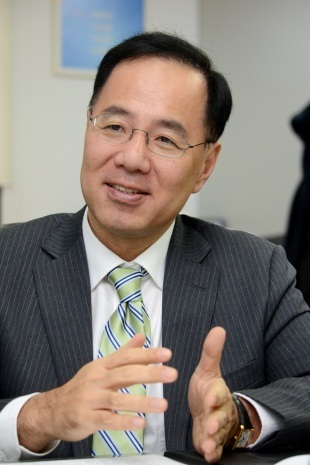Global ICT leaders to discuss Internet governance
ICT firms and nations to meet in Busan to discuss pending issues including who should govern the Internet
By Korea HeraldPublished : Feb. 2, 2014 - 19:52
It has been a long time since the Internet took on a life of its own, and these days, how to govern and regulate cyberspace is a central issue.
There is now a silent but potent power struggle going on between developed and developing countries over who should call the shots on Internet governance.
There is now a silent but potent power struggle going on between developed and developing countries over who should call the shots on Internet governance.

The issue will most likely turn up at the upcoming International Telecommunications Union Plenipotentiary Conference in Busan from Oct. 20-Nov. 7.
The quadrennial conference serves as a venue for countries and companies to meet and discuss ICT policies and standards.
This year, up to 3,000 government officials from 193 member countries and corporate executives including those from Samsung Electronics and Huawei will attend.
Given the sheer size of the meeting, the stakes are high and Min Won-ki, the chairman designate of ITU-PP, is hoping that with a bit of intervention, the related parties would be able to reach a consensus they are all happy with.
“Internet governance has been a major issue for the global ICT sector in the past, and this will once again be at the center of attention,” Min said in an interview with The Korea Herald. “My goal, as the chairperson of this year’s conference, is to fulfill a certain level of expectation for all those involved, if not a unanimous agreement.”
Currently, advanced and emerging nations are divided over whether the non-profit Internet Corporation for Assigned Names and Numbers, or ICANN, should remain in charge of global cyberspace governance. ICANN’s role centers on assigning and managing online identifiers such as domain names and Internet Protocol addresses.
Emerging nations including China and India are opposed to ICANN on the grounds that the organization acts under the influence of the U.S. Department of Commerce. These countries insist on creating a new governance mechanism that is not led by a single organization, but multiple countries.
Developed nations, such as the U.S., however, support the current system, while conceding that it should be improved.
As the issue is politically-charged and prone to dispute, Min hopes to mediate between the different parties in a fair and balanced manner. He is networking with the participants to get a good grasp of their positions.
Taking part in regional preliminary meetings at least once or twice a month, including those that were recently held in Europe and the Middle East, is a part of his efforts to better understand the views held by the ITU members.
Meanwhile, the official issue agenda that the Korean government has come up with are IT convergence, the ‘Internet of Things’, and Critical Information Infrastructure Protection.
“Security issues of the ‘Internet of Things’ will especially be discussed in detail at the working group level,” Min said.
The enactment and revision of the ITU Charter, the selection of council members and a decision on the general rules of the organization and its conferences will also take place at the 19th ITU-PP.
Min is expecting the ministers of the 193 member nations to produce solutions to easing the digital divide between nations and between genders.
“One of the core purposes of the conference is to make technology available for everyone,” Min explained.
The meeting has advantages for the local technology sector as well, he added.
“Dubbed the ICT Olympics, the ITU-PP will give an opportunity for Korean small and medium-sized companies to introduce their latest technologies to potential buyers from all around the world as many sideline events including exhibitions and an ICT expo are scheduled to be held,” the chairman designate said.
“As other cultural performances are to be held, including a hallyu concert, the conference will also serve as a kind of festival for the public as well.”
Min plans to attend up to 50 meetings including 21 plenary sessions during the three-week conference.
By Kim Young-won (wone0102@heraldcorp.com)
-
Articles by Korea Herald







![[KH Explains] Hyundai's full hybrid edge to pay off amid slow transition to pure EVs](http://res.heraldm.com/phpwas/restmb_idxmake.php?idx=644&simg=/content/image/2024/04/18/20240418050645_0.jpg&u=20240419100350)







![[From the Scene] Monks, Buddhists hail return of remains of Buddhas](http://res.heraldm.com/phpwas/restmb_idxmake.php?idx=652&simg=/content/image/2024/04/19/20240419050617_0.jpg&u=20240419175937)

![[KH Explains] Hyundai's full hybrid edge to pay off amid slow transition to pure EVs](http://res.heraldm.com/phpwas/restmb_idxmake.php?idx=652&simg=/content/image/2024/04/18/20240418050645_0.jpg&u=20240419100350)

![[Today’s K-pop] Illit drops debut single remix](http://res.heraldm.com/phpwas/restmb_idxmake.php?idx=642&simg=/content/image/2024/04/19/20240419050612_0.jpg&u=)